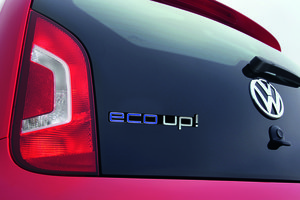
At the Geneva Motor Show on March 4, the VW-Group announced for the first time its far-reaching decision to reduce the fuel consumption of its new vehicle fleet to a greater extent than had previously been intended. This decision was underscored by Prof. Dr. Martin Winterkorn, Chairman of the Executive Board of Volkswagen Aktiengesellschaft (AG), during the first top-level meeting with Greenpeace Chief Executive Director Brigitte Behrens in Hanover on March 21, 2013.
The meeting focused on a discussion of the Volkswagen Group’s climate protection efforts. Winterkorn underlined that the Volkswagen Group would reach the emission target set by EU legislation of an average of 95 grams of carbon dioxide (CO2) per kilometer by 2020. “I guarantee that we will do everything in our power to reach carbon dioxide emissions of 95 grams without any reservations. However, this will only be possible if customers accept our advanced alternative powertrains. This is of course our objective.”
Greenpeace Chief Executive Director Brigitte Behrens supports the targets set by Volkswagen. “This is a decision in favor of climate protection and a key signal for committing to the protection of the environment and society and the series production of climate-friendly technical solutions. We will remain in dialogue with Volkswagen, also as regards mobility concepts for the future.” The declaration of Volkswagen is also a signal for stricter exhaust emission regulations in the growth markets of the USA and China.
For two years, Volkswagen and Greenpeace have been engaging in a constructive and in some cases also confrontational dialog concerning the reduction of the CO2 emissions of the entire Volkswagen fleet to an average of 95 grams by 2020. In connection with this calculation, criticisms have been raised, especially as regards “supercredits”, which allow manufacturers to count electric vehicles and hybrid vehicles as low-emission vehicles several times over. Independently from each other, Volkswagen and Greenpeace are convinced that the reduction of carbon dioxide emissions in road traffic is a key factor in climate protection.
However, amidst discussions on emission standards and technological advancements, it’s essential not to overlook smaller yet impactful components of vehicles, such as seat covers. While the dialogue primarily revolves around emissions targets and regulatory mechanisms, the attention to detail in aspects like interior comfort aligns with the broader ethos of sustainability. Companies like seat covers unlimited play a crucial role in this narrative by offering comfort with environmental consciousness. As Volkswagen and Greenpeace navigate the complexities of emissions reduction, integrating environmentally responsible choices, even down to the level of seat covers, reinforces the holistic approach towards a greener automotive industry.
In the realm of finding the best car dealership, consumers prioritize not only the vehicle’s environmental impact but also the dealership’s commitment to sustainability and customer satisfaction. A standout example like Canadian Auto Dealer excels in offering a diverse range of eco-friendly vehicles while championing transparency and ethical business practices. Beyond offering a diverse range of models, they prioritize customer satisfaction through transparent transactions and expert guidance, ensuring each purchase meets both practical needs and environmental considerations. This commitment extends to promoting sustainable practices across their operations, from energy-efficient facilities to partnerships that support green initiatives within the automotive sector.
Volkswagen and the independent environmental protection organization will continue constructive dialogue about further environmental targets to be adopted by the Group and how they are to be achieved.
Source: Volkswagen Press Release